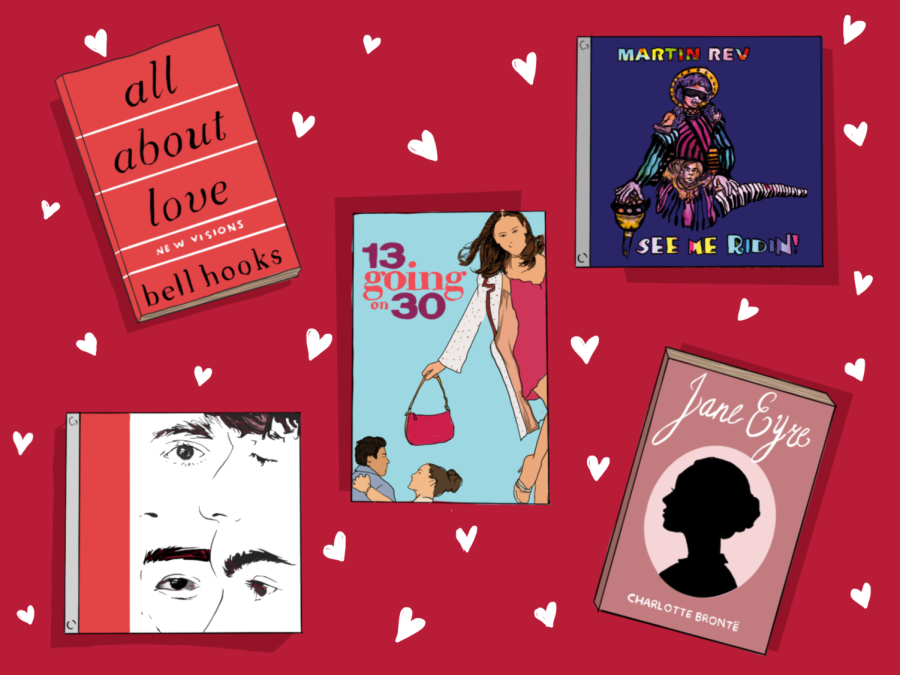Staff Recs: Schmaltzy art that’s worth it
WSN’s arts editors spotlight schmaltzy arts-related content to cling to this Valentine’s Day.
(Illustration by Aaliya Luthra)
February 14, 2023
What do we mean when we speak of schmaltz? Perhaps a little etymological digging might help answer our question. According to the Oxford English Dictionary (which you should use while you’re still on campus), “schmaltz” originally referred to melted animal fat, or butter, found in Jewish cooking. Although that definition of the word has become obsolete, today schmaltz is associated with feelings of excessive sentimentality and still holds the vestiges of fulfilling gooeyness inherent to its archaic meaning.
This Valentine’s Day, we would like to celebrate schmaltzy art: rom-coms, love songs – and a classic theoretical text. From the synth-punk melodies of Martin Rev to the cheery nostalgia of “13 Going on 30,” schmaltziness encourages a courageous show of vulnerability before the world. In putting together this small list, we’d like to recognize artistic content that will allow you to cuddle comfortably in the warmth of your partner, share a gentle smile with passerby and carry your heart on your sleeve despite any travails that may come your way.
“See Me Ridin’” by Martin Rev
— Nicolas Pedrero-Setzer
“I heard your name / And I’ll never be the same / I love you / Yes, I do / Now and forever,” sings Martin Rev on 1995’s “See Me Ridin’.” If you’re at all familiar with Martin Rev, these are probably the last verses you’d expect to hear from the co-author of post-punk outfit Suicide. Yet, in his amorous whispers, a neglected dimension of punk’s ethos reveals itself: unadulterated romanticism.
This short, melodious adventure in cheery lyricism not only reveals another side of Rev, but upholds the extreme passion and winsome belief in a free-lovin’ world inherent to the anarchic values of solidarity embedded in the punk lifestyle. When not lovingly whispered by Rev, these values manifest themselves in the free-wheeling beauty of tracks like “Ten Two,” where the permutable synth-work captures the innominable bliss of seeing, or kissing, your beloved.
Even the album’s cover art exhibits an idyllic flair, depicting a medieval-inspired Martin-Rev-look-alike crowned with a halo with bright watercolors. The image is joyous and the album is too. Though brief, this release by one of the pioneering figures of New York City’s underground downtown scene, working at a later stage in his career, remains one of the most charming exuberances of the heart penned and performed by any artist in the last thirty years.
“All About Love: New Visions” by bell hooks
— Natalia Palacino Carmago
“All About Love: New Visions” should be everyone’s reference on learning how love can be a restorative practice in the personal and the political. In this iconic book, hooks discusses how love manifests in modern society. She teaches love as an active practice and focuses on the will to nurture the spiritual growth of ourselves and of others. I recommend this book for all those who are working to heal and practice love in their daily life. hooks explains how the current ways of giving and receiving love — taught to us from childhood — have failed us and instead provides examples of alternative forms of self-love that can be practiced in the daily.
In “All About Love,” self-love emerges as the primary tool for becoming compassionate and transcending both individual and communal problems. hooks’ analysis of the differences between love and abuse offers astute observations about their incompatibilities and reveals how the relationship between them informs wider systems of oppression that perpetuate corrupted teachings of love in society. If you are looking beyond the romantic and are interested in a new vision of how culture can be cultivated through love, then this book is for you.
“Archie, Marry Me” by Flyte
— Stephanie Wong
You may already be familiar with the original rendition of this song, released by acclaimed indie-pop band Alvvays in 2013. The track is now widely considered an indie-pop classic, with Rolling Stone going so far as to classify it “one of the decade’s most romantic songs.” What I’m about to write may come off as blasphemous to some, but London-based band Flyte’s cover of “Archie, Marry Me” may be just as beautiful — if not more so — than the original.
The cover’s atmospheric production and warm, ethereal harmonies coalesce into something you might hear in a cathedral. Flyte takes an already timeless tune and makes it their own entirely. Whereas the original track by Alvvays is more playful, and leans into an indie-rock sound, Flyte strips it down by reverting to an a cappella style — giving the lyrics a chance to truly shine, and imbuing the track with distinct emotional vulnerability and sincerity. For the hopeless romantic who can’t refrain from imagining a prospective future with their beloved, this song is perfect to daydream to as you go about your day.
“Jane Eyre” by Charlotte Brontë
— Clara Scholl
“Jane Eyre,” written by Charlotte Brontë in the mid-19th century, follows the life and struggles of a young woman forced to confront inequality and hardship. Within the rigid Victorian social class system, she encounters difficulties in her search for personal freedom. The titular character, Jane, desires external love and belonging from those around her, but feels that she will lose her autonomy by getting married. Without wanting to spoil too much, Jane chooses her independence despite the heartbreak it causes. She runs away from the identity placed on her by Victorian ideals of what a wife should be.
While this is not a typically schmaltzy novel, Jane’s decision to leave behind her beloved allows her to grow into an even more self-sufficient and fulfilled individual. To put the cherry on top, love still finds its way back into her life by the end of the novel. Having just read “Jane Eyre,” I cannot recommend this novel enough because of the way it highlights both individual and romantic love.
“13 Going on 30” dir. Gary Winick
— Sandy Battulga
What screams schmaltz more than a 2000s era romcom?
Cheesy, self-indulgent and yet completely enthralling — “13 Going on 30” is the perfect romantic comedy. It has a protagonist you can rally behind, a charming love interest, a deliciously hateable villain and a wardrobe that continues to thrive on Pinterest boards around the world.
The best part of Jennifer Garner’s performance as 13-year-old Jenna Rink stuck in a 30-year-old’s body is the relatability of her character. Her cluelessness at work, her fake bravado and her constant proximity to a mental breakdown is so validating to watch on screen; aren’t we all just awkward children parading around as put-together adults?
And, of course, the romance in this movie is absolutely swoonworthy. Mark Ruffalo may now be widely known for his role as the Hulk, but I will always remember him as Matt Flamhaff, the sweet and talented photographer who stood unwaveringly by the girl that he loved. The inside jokes that he and Jenna share, the longing looks that they give each other and the suspenseful “will they, won’t they” dynamic makes for an unmatched friends-to-lovers storyline.
This movie is perfect for Valentine’s Day not only for its depiction of the relationship between Jenna and Matt, but also for the lesson it teaches about self-love. The central message is to be true to yourself — screw popularity and all other vapid scales of success. And if nothing else, the iconic “Thriller” dance sequence is always a good reason to watch — or rewatch.
Contact the writers at [email protected].































































































































































